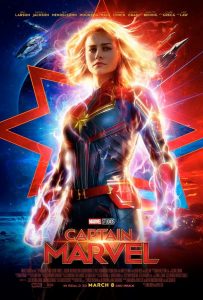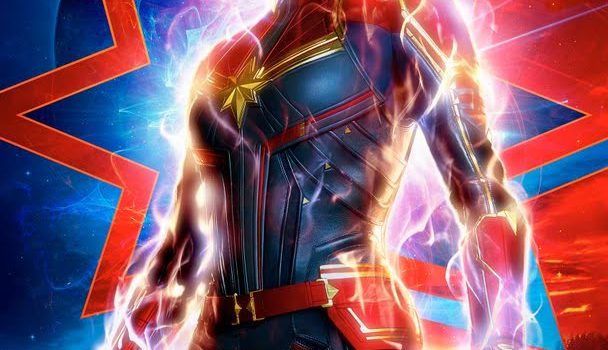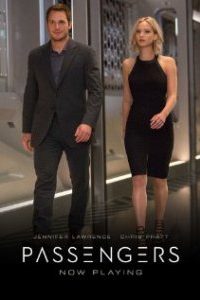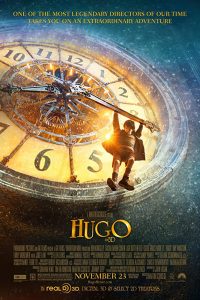With Great Power Comes Great Fun: Josh Pearce and Arley Sorg Discuss Captain Marvel
 It is the distant future: 1995. In this 21st installation of the Marvel Cinematic Universe, and the first female-led Marvel movie, Brie Larson plays Vers, a green blue-blooded member of the Kree, a technologically advanced race of aliens who value emotional control. Vers and her mentor, Yon-Rogg (Jude Law) lead a Starfleet Starforce secret mission against the Romulans Skrull, a shapeshifting race that has been at war with the Kree for centuries.
It is the distant future: 1995. In this 21st installation of the Marvel Cinematic Universe, and the first female-led Marvel movie, Brie Larson plays Vers, a green blue-blooded member of the Kree, a technologically advanced race of aliens who value emotional control. Vers and her mentor, Yon-Rogg (Jude Law) lead a Starfleet Starforce secret mission against the Romulans Skrull, a shapeshifting race that has been at war with the Kree for centuries.
The Starforce team is ambushed and Vers crash-lands alone on Earth where she is found by S.H.I.E.L.D. agent Nick Fury (Samuel L. Jackson) who can understand her alien language because Vers uses a Universal Translator universal translator. The Skrull infiltrate Earth, searching for a top-secret MacGuffin. Vers slowly comes to realize that the flashbacks that plague her are memories of her life on Earth because she is actually Carol Danvers, former Air Force pilot who lost her memories after a crash, a fact she never realized before because many aliens species in the universe are anatomically indistinguishable from humans.
Vers and Fury team up to end the Kree-Skrull war and save the world. Vers learns to control the power of her phasers photon blasts, and Fury befriends a cat Tribble Flerken, which can sense even a surgically altered Klingon fully disguised Skrull. In the end, Danvers realizes that her true power comes from embracing her human side.
Josh: Snark aside, you can tell I thought this was a really good Star Trek movie.
Arley: Better than the new ones.
Josh: Even better than some of the older ones. And I say this as a huge fan of Star Trek.
Arley: I agree. Captain Marvel starts as a good standalone science fiction action movie. Hala, the Kree capital, was the best science fiction-looking city we’ve seen in any of these comic book movies. Clearly Marvel threw lots of money into the budget to make the tech, visuals, and special effects look polished, so I liked the opening scenes, especially the combat practice between Vers and Yon-Rogg. 99% of the time, these kinds of scenes are tired and the fighters are not even that good, but in this one I could tell they were setting up certain parts of the plot that would come in later, and the actual fighting was pretty good.
Josh: There was some infodump in that scene, which was an interesting way to do it because there’s something happening on screen while they’re talking.
Arley: They bring it right to the edge, like, two more facts would have been too much. Kept things moving along. But after she lands in Blockbuster, the movie shifts gears from a sci fi action movie to a spy movie, which really slowed things down for me. You don’t want to go from action to sneaking around, it should go the other way around. It should ramp up.
Josh: At that point it became a sub-par Men in Black movie.
Arley: Once you’ve said it, I can see why you make that comparison, if you haven’t watched the larger body of the Marvel shows. But this isn’t just happening in a vacuum. It’s also set against the backdrop of the Agents of S.H.I.E.L.D. TV show which has dealt with the Kree and Agent Coulson before, and this gives you more context. So even though the movie starts out as standing apart from the previous Marvel movies, it becomes part of a bigger universe.
Josh: I haven’t seen that show, so I was looking for something to draw comparisons to. I think this is where having five writers creates a problem. You said in our last review (of The Wandering Earth) that so many writers usually just get in the way of each other, which is what I felt happened to Captain Marvel. Someone was doing the Star Trek movie and someone else was doing the MIB movie and no one was writing the connecting bits.
The writing breaks down in a few spots. The Marvel Studios logo now contains a Stan Lee tribute which is nicely done and not heavy-handed, but Lee also makes a cameo appearance later in the movie which pauses the story too long, so that Vers and Lee can exchange significant looks. In the middle of an action sequence.
Some of the dialogue is a little clunky. For example, at one point Fury says, “That’s not the craziest thing I’ve heard today,” and Vers replies, “The day is young,” which not only veers into cliché, but is completely backward and makes no sense. (Even if Fury hears something crazy later on, what Vers just told him still won’t be the craziest thing he’s heard today.) As if someone copy-pasted that bit of text and nobody proofread it too closely.
Josh: A lot of the humor was not landing for me. Samuel L. Jackson is a funny guy, and I was having that same kind of Men in Black comedy feeling at certain points, but there weren’t a lot of jokes that I actually laughed at.
Most of the actors and performances were strong, and many of the characters had good chemistry with each other: Marvel and Fury, Marvel and Jude Law, Marvel and Rambeau (Lashana Lynch), who gave probably the best acting in a single, five-second scene. Unfortunately, Rambeau is not introduced until pretty late into the movie. The story would have been better served if it showed more of Danvers and Rambeau as test pilots, like a female Top Gun.
There are two major storytelling themes in the movie. One is resilience, which is set up early through a montage of Danvers being mocked for daring to dare. This montage is one of the few times she is (briefly) shown as a member of the Air Force, and only then to illustrate women being discouraged from this career path. Rambeau is not included in many of these flashbacks, which would be the perfect chance to have her there by Danvers’s side, going through and overcoming the same hardship.
The second theme is emotion versus logic, common in movies about how to make a hotheaded warrior conform to military discipline. (Again, Top Gun.)
Josh: She is Spock and Kirk in the same body. Struggling with and then finally giving free rein to her enthusiasm, passion, and exuberance.
Arley: Something that’s cool about this movie and her character is that Captain Marvel has sort of a badass but fun personality. When she powers up and blows up ships, she’s yelling with delight. It’s different from the Avengers movies, which are so heavy and dark. She’s telling jokes, smiling, having a good time. There’s sort of an uplifting element in that.
Josh: I was hoping that this movie would double down on that. I was expecting a little more flash and fun for the audience, like Guardians of the Galaxy. Some of the elements are there — the Kree, Ronan the Accuser, the same spacecraft and technology. Nicole Perlman, who wrote Guardians, is one of the writers for this, but Captain Marvel doesn’t go all out in the same way.
Arley: Tonally, it’s halfway between Guardians and Avengers. A bit of a palate cleanser before Avengers: Endgame.
Captain Marvel attempts a bit of non-linear storytelling, slowly unfolding Carol Danvers’s origin story retroactively, but the risk of using flashbacks to convey much of the movie’s most important information is that the plot momentum stalls out from time to time and has to struggle to regain speed.
Josh: I applaud the attempt, but I think it came out a little messy.
Arley: Captain Marvel is essentially invulnerable to everything, so there’s no sense of real suffering or danger. She doesn’t ever earn anything. There are plot events and there are things she does, but there’s no journey, and that makes everything seem one note in a sense, makes it kind of boring.
Josh: Her power grade is way out of whack. This ties in with the non-linear story, because I was having a bit of trouble keeping up with how powerful she was supposed to be at certain parts of the movie. There’s a scene of her in a plane crash where I said, “Good thing she’s this super-powerful alien,” until I realized that it was happening to Danvers before she had any powers. And yet she survives completely unscathed. Likewise, her photon blasts can punch holes in the side of spaceships but just knock over anyone she hits with them. The inconsistency stops me from worrying about the results of any fight scenes. We noted this before, in our Deadpool 2 review. We even titled it, “Is An Unkillable Hero Worth Watching?“
Probably the easiest comparison to make is Captain Marvel against Wonder Woman and the way that the two studios empower their respective heroes. Plotwise, Wonder Woman does it better. Even though Wonder Woman possesses godlike abilities, the gradual reveal of her true powers (revealed to herself and the audience) keeps the tension building throughout the film. And at the end, she still faces an opponent who can actually kill her.
Josh: Captain Marvel doesn’t have a proper boss fight.
Arley: They needed a badass villain, one strong enough to potentially hurt her, so she would still have to find a way to rise up and defeat them. (I wish they could have used Super-Skrull.)
Wonder Woman was a gamechanger as the first major comic book movie starring a female superhero, so Captain Marvel‘s impact is lessened in that sense. But Captain Marvel advances the dialogue in its own ways: She’s a woman having fun with her powers, unlike the heavy responsibility of Wonder Woman; she’s not sexualized, not a stunning supermodel in a skimpy suit; her costume covers her, head-to-toe; she’s a fighter pilot. The filmmakers treat her the way they would treat a man, and don’t undercut that with any romantic subplot at all, which is tough to do in a commercially successful movie (which Captain Marvel already is). Maybe the most significant strictures being broken are the unseen/subtle ones in the making and marketing of the film itself.
Arley: It was a super-enjoyable movie, entertaining and mostly well written. Besides the spy plot. And I didn’t like some of the things they did with the Skrull.
Josh: Ben Mendelsohn’s accent was just ridiculous for Talos. Distracting. None of the other Skrulls sounded like that, his own family didn’t sound like that. I know that Mendelsohn can do other voices (he even does so in Captain Marvel) so that decision was a terrible one. Talos is supposed to be the big green baddie here and I couldn’t take him seriously.
Arley: What was distracting for me was that the Kree names were sometimes Greco-Roman names and sometimes not. For no reason. I needed a reason.
Josh: I think you liked it more than I did, but I’m optimistic about sequels now that she’s come into her powers. I really like Lee Pace as Ronan, so I’m excited to see if he returns to challenge her and how they’ll “defeat” each other because, since this is a prequel, we already know that both of them will survive.
Arley: We both agree it could have been better, if they had more vulnerability and more power balance. It’s not Black Panther and it’s not Spider-Verse (those were gamechangers), but it’s not terrible and it’s even an important movie in some ways. Some cool tidbits for the comic book fans — although as a comic book reader, there were also changes I didn’t like. All in all, a fun movie, definitely worth watching!
Written by: Anna Boden, Ryan Fleck, Geneva Robertson-Dworet, Nicole Perlman, & Meg LeFauve
Starring: Brie Larson, Samuel L. Jackson, Ben Mendelsohn, Jude Law, Annette Bening, Lashana Lynch, Clark Gregg, Rune Temte, Gemma Chan, Algenis Perez Soto, Djimon Hounsou, Lee Pace, Chuku Modu, Matthew Maher & Akira Akbar

ARLEY SORG, Associate Editor, grew up in England, Hawaii, and Colorado. He studied Asian Religions at Pitzer College. He lives in Oakland, and usually writes in local coffee shops. A 2014 Odyssey Writing Workshop graduate, he is soldering together a novel, has thrown a few short stories into orbit, and hopes to launch more.
JOSH PEARCE, Assistant Editor, started working at Locus in 2016. He studied creative writing at SFSU and has sold short stories and poems to a variety of speculative fiction magazines. Born and raised in the Bay Area, he currently lives in the East Bay with his wife and son and spends way too much time on Twitter: @fictionaljosh. One time, Ken Jennings signed his chest.
 While you are here, please take a moment to support Locus with a one-time or recurring donation. We rely on reader donations to keep the magazine and site going, and would like to keep the site paywall free, but WE NEED YOUR FINANCIAL SUPPORT to continue quality coverage of the science fiction and fantasy field.
While you are here, please take a moment to support Locus with a one-time or recurring donation. We rely on reader donations to keep the magazine and site going, and would like to keep the site paywall free, but WE NEED YOUR FINANCIAL SUPPORT to continue quality coverage of the science fiction and fantasy field.
©Locus Magazine. Copyrighted material may not be republished without permission of LSFF.









“She doesn’t ever earn anything. There are plot events and there are things she does, but there’s no journey, and that makes everything seem one note in a sense, makes it kind of boring.”
But in all her flashbacks you see people wanting to tear her down and her not losing that. I think the ‘journey’ in this movie wasn’t one of her superpowers, but of her as a person coming into her strength and finding her identity and what she wants to do. She earned her strength, she earned her confidence, as a human which led her to being a perfect fit for a hero.
You guys would know. Didn’t Captain Marvel used to be a guy?
Agree that a movie derived from comic books that began publication in the 1960s and a movie franchise derived from a TV series that first aired in the 1960s share some of the same common story-telling devices.